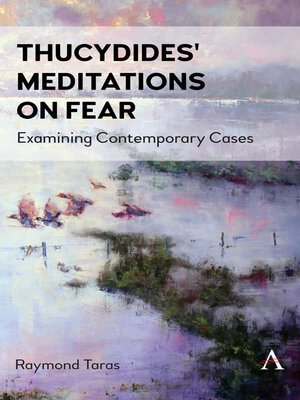
Sign up to save your library
With an OverDrive account, you can save your favorite libraries for at-a-glance information about availability. Find out more about OverDrive accounts.
Find this title in Libby, the library reading app by OverDrive.



Search for a digital library with this title
Title found at these libraries:
| Library Name | Distance |
|---|---|
| Loading... |
Understanding contemporary global politics by connecting them to the meditations of a classical Greek philosopher may seem farfetched and counterintuitive. But for political theorists, policymakers, the new influencers, journalists and engaged students, Thucydides' ancient wisdom provides insights into diagnosing and even undermining an endemic of political fear spreading across the world's borders. With his help, this book probes six case studies of aspiring great powers and the brittle identities that they may have unwittingly constructed. Raymond Taras questions the motives of the manipulators of fear whether found in in authoritarian states or increasingly in backsliding liberal democratic ones. The urgency of returning to and respecting tolerance in states establishing relations with arriving refugees and migrants takes on critical importance.
|Examining today's global politics by linking it to the meditations of a classical Greek philosopher may be counterintuitive to understanding a world in crisis. But for political analysts, policymakers, social media, bloggers, journalists, engaged students, the new influencers, and inquisitive citizens, Thucydides' ancient wisdom may offer critical insights into detecting the endemic of political fear spreading across global borders. With his help and by applying his framework to six case studies, this book unearths the different facets of fear that define a world in crisis.
Fear is a pervasive term used to describe a group's or individual's sense of insecurity, threat, and angst. It identifies other subtle dimensions comprising suspicion, scepticism, wariness, dread, horror, stupefication, and moral panic. These events may arise in the very near future or affect society at some later point, as Thucydides discovered in his analysis. Disaggregating political fear makes us aware of its complexities as the classical Greek writer set out twenty-five centuries ago. Framing his study to today's fears results in significant ramifications for democracy and rivalries between states.
Thucydides' meditations on fear is about six intriguing case studies structuring political fear: national fear which caused the Brexit outcome in the UK; a regional kind fomenting fear of foreigners in Germany's Saxony state; an ethnic dimension emerging in a Russia fearful of too much in-migration; an individual case of a Japanese artist experiencing angst when caught between adversaries in World War II; fear of interstate relations shaping Australia's troubled connections to China; and the precariousness of identity as the U.S. began to embrace tribal politics. In all this, can a rejuvenated liberal theory unpacking a heavy dose of tolerance overcome symbolic liberalism and slam the door on ever-mounting political fear?







